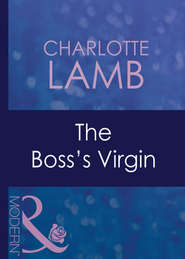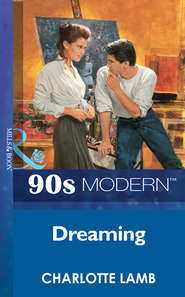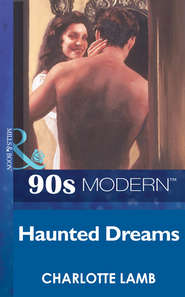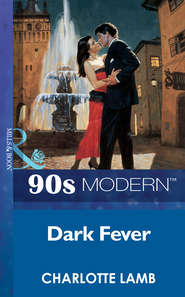По всем вопросам обращайтесь на: info@litportal.ru
(©) 2003-2025.
✖
The Marriage War
Автор
Год написания книги
2018
Настройки чтения
Размер шрифта
Высота строк
Поля
The Marriage War
CHARLOTTE LAMB
FORBIDDEN! Something worth fighting for! Sancha's first instinct was to burn the anonymous letter. Its malicious message couldn't be true: Do you know where your husband will be tonight? Do you know who he'll be with? Sancha adored Mark now as much as when they were first married, even though family life meant that they were no longer so close.She'd never dreamed that her tough, handsome husband would fall into the arms of another woman! The battle was on - though when Sancha confronted Mark, she discovered that the physical attraction between them was as strong as ever. But she wouldn't let herself be seduced by him… . Not yet!When passion knows no reason… . FORBIDDEN!
Sancha, don’t stop now.... You want it, I want it, we both need it—you know we do!“ (#u3640ae54-c98d-5cc0-8196-fce7690868eb)About the Author (#uda7d73cd-47e4-58c7-99e3-8f6d9e2225f3)Title Page (#u14e45107-f78b-58f9-abf3-100bf87bc1ab)CHAPTER ONE (#u0ef5e002-d286-584d-a929-751ea8d69a99)CHAPTER TWO (#ub2b7426f-cd12-5d5b-98af-9f6c3858df43)CHAPTER THREE (#litres_trial_promo)CHAPTER FOUR (#litres_trial_promo)CHAPTER FIVE (#litres_trial_promo)CHAPTER SIX (#litres_trial_promo)CHAPTER SEVEN (#litres_trial_promo)CHAPTER EIGHT (#litres_trial_promo)CHAPTER NINE (#litres_trial_promo)Copyright (#litres_trial_promo)
Sancha, don’t stop now.... You want it, I want it, we both need it—you know we do!“
He held out his hands; they were trembling slightly. “See that? That’s how much I want you.”
“As much as you wanted her the other night?” she asked bitterly, and he shut his eyes, groaning, turning away.
“Oh, not again! Do we have to bring that up again? Forget Jacqui!”
“I can’t. Can you? Working with her every day, seeing her, being alone with her? You may not have slept with her—but you admit you almost did. Is she going to accept the end of the affair...?”
“We never had an affair!”
CHARLOTTE LAMB was born in London, England, in time for World War II, and spent most of the war moving from relative to relative to escape bombing. Educated at a convent, she married a journalist, and now has five children. The family lives on the Isle of Man. Charlotte Lamb has written over a hundred books for Harlequin Presents.
The Marriage War
Charlotte Lamb
www.millsandboon.co.uk (http://www.millsandboon.co.uk)
CHAPTER ONE
THE morning the anonymous letter arrived was no different from any other Sancha had had over the past six years.
She had opened her brown eyes with a reluctant jerk when the alarm went off, hearing Mark stir in the twin bed beside hers before he stretched, yawning. For a second or two Sancha had fantasised about the years before the children started arriving, remembering waking up in a double bed, naked and sleepy, to find his hands wandering in lazy exploration. In those far-off, halcyon days they had usually made love in the early mornings as well as at night.
They had switched to twin beds a couple of years ago because she was always having to get up in the night, either to feed a baby or comfort a child, and Mark had complained about being woken whenever she left their bed. Sancha had often wished, since, that they had not stopped sharing a bed. They had lost their old, loving intimacy; making love could no longer be so spontaneous or casual, and since Flora’s birth they’d rarely made love at all. At night Sancha was always too tired and in the mornings there was never time.
This morning she reluctantly pushed her memories aside and made herself fling back the duvet, her feet fumbling for slippers, groping her way into her dressing-gown. She rushed into the bathroom, cleaned her teeth, splashed cold water on her face, ran a comb through her curly red-brown hair and then began the job of waking the children. She didn’t have to wake Flora, who was already bouncing noisily round and round her cot, stark naked, with her red hair in tangled curls around her pink face.
‘I’m a kangaroo! Look at me, Mummy, I’m a kangaroo-roo-roo...’
‘Lovely, darling,’ Sancha said absently, retrieving the small nightdress from the floor and dropping it into the washing basket before picking Flora up with one arm and carrying her into the childrens’ bathroom. ‘Get up now!’ she yelled into the room the two boys shared. Six-year-old Felix was still lying in bed, with his duvet pulled over his head. Five-year-old Charlie was up, pulling off his pyjamas with his eyes shut.
By the time Sancha had dealt with Flora and was heading for the stairs Felix was up, still yawning, and Charlie was in the bathroom. Sancha could hear Mark having his shower.
Downstairs, she scooped the letters and a daily newspaper off the front doormat, with Flora squirming under her arm, her dimpled legs in green dungarees kicking vigorously. Sancha disliked wasting money, so she had kept all Charlie’s baby clothes, washed and neatly folded away in a drawer, in case another baby came along. It had saved a fortune. She hadn’t needed to buy any new clothes at all and Flora looked great in them. The fashion for unisex baby clothes suited her.
Turning towards the kitchen, Sancha shouted back up the stairs to the two boys to hurry up or else. A sound of stampeding feet followed; at least they were both up.
Dropping the handful of letters and the newspaper onto the table, beside Mark’s place, she pushed Flora into her highchair, handing her a spoon to bang, and then put the coffee percolator on.
She didn’t bother to look through the letters—she rarely got any: just the odd postcard from a friend or relative who was abroad on holiday, brown envelopes from a wishful tax inspector who refused to believe she no longer earned any money, or offers from catalogues and firms trying to sell her something which came in envelopes marked urgently ‘Open me and win a fortune!’ She read the postcards, but the rest of her mail was usually discarded into the kitchen bin at once.
All Sancha’s movements at this hour of the morning were automatic; she often felt like a robot, moving and whirling around the kitchen. She had so much to do and so little time to do it in that she had worked out long ago the fastest way to get the coffee percolating, the porridge cooking, slip a couple of croissants into the microwave to warm through, set out cups, cutlery and mugs of cold milk, pour the orange juice and spoon prunes into a bowl for Mark. All with the minimum of effort.
Hearing the crash of feet on the stairs, she turned off the porridge, poured it into the childrens’ bowls, put the saucepan into the sink and ran cold water into it to make it easier to clean later, then grabbed Flora, who was climbing out of her highchair, and put her back into it just as Felix and Charlie tore into the kitchen.
Sancha caught them and checked that their faces and hands were clean, their teeth and hair brushed, their clothes all present and correct—Charlie often forgot important items, like his underpants or one sock. He was very absent-minded.
By the time Mark got down his children were all busy eating their breakfast. Flora beamed at him, showing him a mouthful of porridge and little pearly teeth. ‘Dadda!’ she fondly greeted him.
Mark looked pained. ‘Don’t talk with your mouth full, Flora!’ He sat down and drank some of his orange juice, looking at his watch with a distracted expression. ‘I’m going to be late. Hurry up, boys, we have to go soon.’
He ate his prunes while glancing through his mail. “This is for you,’ he said, tossing one envelope over to Sancha, his grey eyes briefly touching her then moving away, a frown pulling his black brows together.
She felt a sting of hurt over that look—had that been distaste in his eyes? Of course, at this hour, in her shabby old dressing-gown and no make-up, she wasn’t exactly glamorous, but there was no time to do much about how she looked until he and the boys had left. She really must make more effort, though—it made her unhappy to have Mark look at her like that, as if he didn’t love her any more. Her love for him was just as strong; she needed him.
To cover her distress, she picked up the white envelope. The name and address had been typed. ‘I wonder who this is from?’ she thought aloud, studying the postmark. It was local, which didn’t help.
‘Open it and find out,’ Mark snapped.
What was the matter with him this morning? Hadn’t he slept? Or was he worried about work? Sancha wished there was time to ask him, but Flora had knocked over her mug of milk. Sighing, Sancha mopped up the damage while Mark averted his gaze.
‘None of the boys were this much trouble,’ he muttered.
‘You just don’t remember, and she isn’t really naughty, Mark. Just high-spirited.’ Sancha wiped Flora’s sticky face, kissing her on her snub nose. ‘You’re no trouble, are you, sweetheart?’
Flora leaned forward and gave her a loving bang on the forehead with her porridgy spoon, beaming. Sancha couldn’t help laughing. ‘Finish your breakfast, you little monkey!’
Mark got to his feet, looking out of place in this cosy, domestic room with its clutter of children, pine furnishings and cheerful yellow curtains. He was a big man, over six feet, with a tough, determined face and a body to match—broad shoulders, a powerful chest, long, long legs. His nature matched, too. People who had never met him before always gave him a wary look at first—he had an air of danger about him when he didn’t smile, and he wasn’t smiling now. He looked as if he might explode at any minute. He often had, over the last few months.
A pang of uneasiness hit Sancha—was Mark tired of family life after six years of babies? He was a man of tremendous drives; their sex life had been tumultuous before the children arrived, and Sancha missed those passionate nights. And his work as a civil engineer demanded a lot of energy, though he no longer spent so much time out on any of the sites where his firm were building. Mark was more often in the office now, planning, organising, working out on paper rather than physically, in the field, and she suspected he regretted the change in his working pattern. Did he also regret being married, having children, being tied down?
Curtly he said, ‘Oh, by the way, I’ll be late tonight.’ Sancha’s heart sank. He was always being kept late at the office. ‘What, again? What is it this time?’
‘Dinner with the boss again. Can’t get out of it. He wants to talk about the new development at Angels Field. We’re running late on the schedule, and time is money.’ But he didn’t meet her eyes, and she felt another twinge of uneasiness.
Oh, no doubt she was imagining things, but her intuition told her something was wrong—what, though?
He turned away and said impatiently, ‘Are you ready, boys? Come on, I can’t wait any longer.’ He always drove the boys to school, and Sancha picked them up again at three-thirty.
They clambered down from the table and headed for the door into the hall, but Sancha caught them before they could get away. ‘Wash your hands and faces. You’ve got more porridge on your face than you got into your mouth, Charlie.’
Mark had gone to get the car. Sancha dealt with the boys and followed them to the front door, with Flora lurching along behind her.
‘Try not to be too late,’ Sancha called to Mark when the car drew up outside, and the boys got into the back seat and began doing up their seat belts.
Mark nodded. Early May sunlight gleamed on his smooth black hair; she couldn’t see his eyes, they were veiled by heavy lids, but that air of smouldering anger came through all the same. What was the matter? Was something wrong at work? This weekend she must try to find time to sit down and talk to him, alone, once the children were in bed.
The car slid away; Sancha waved goodbye and stood in the porch for a few moments, enjoying the touch of morning sunlight on her face. It would soon be high summer; the sky was blue, cloudless, and there were roses out, and pansies, with those dark markings that looked like mischievous faces peeping from under leaves. The lilac tree was covered with plumes of white blossom which gave the air a warm, honeyed fragrance.
The house was a modern one, gabled, with bay windows on both floors. Detached, it was set in a large garden, with a low redbrick wall both front and back and a garage on one side. Mark’s firm had built it for him when they’d got married, but they had a large mortgage and at times money had been tight—although it seemed easier now that Mark had been promoted and had a better-paid job. That meant working longer hours, however, and Sancha often wished he had fewer responsibilities.
CHARLOTTE LAMB
FORBIDDEN! Something worth fighting for! Sancha's first instinct was to burn the anonymous letter. Its malicious message couldn't be true: Do you know where your husband will be tonight? Do you know who he'll be with? Sancha adored Mark now as much as when they were first married, even though family life meant that they were no longer so close.She'd never dreamed that her tough, handsome husband would fall into the arms of another woman! The battle was on - though when Sancha confronted Mark, she discovered that the physical attraction between them was as strong as ever. But she wouldn't let herself be seduced by him… . Not yet!When passion knows no reason… . FORBIDDEN!
Sancha, don’t stop now.... You want it, I want it, we both need it—you know we do!“ (#u3640ae54-c98d-5cc0-8196-fce7690868eb)About the Author (#uda7d73cd-47e4-58c7-99e3-8f6d9e2225f3)Title Page (#u14e45107-f78b-58f9-abf3-100bf87bc1ab)CHAPTER ONE (#u0ef5e002-d286-584d-a929-751ea8d69a99)CHAPTER TWO (#ub2b7426f-cd12-5d5b-98af-9f6c3858df43)CHAPTER THREE (#litres_trial_promo)CHAPTER FOUR (#litres_trial_promo)CHAPTER FIVE (#litres_trial_promo)CHAPTER SIX (#litres_trial_promo)CHAPTER SEVEN (#litres_trial_promo)CHAPTER EIGHT (#litres_trial_promo)CHAPTER NINE (#litres_trial_promo)Copyright (#litres_trial_promo)
Sancha, don’t stop now.... You want it, I want it, we both need it—you know we do!“
He held out his hands; they were trembling slightly. “See that? That’s how much I want you.”
“As much as you wanted her the other night?” she asked bitterly, and he shut his eyes, groaning, turning away.
“Oh, not again! Do we have to bring that up again? Forget Jacqui!”
“I can’t. Can you? Working with her every day, seeing her, being alone with her? You may not have slept with her—but you admit you almost did. Is she going to accept the end of the affair...?”
“We never had an affair!”
CHARLOTTE LAMB was born in London, England, in time for World War II, and spent most of the war moving from relative to relative to escape bombing. Educated at a convent, she married a journalist, and now has five children. The family lives on the Isle of Man. Charlotte Lamb has written over a hundred books for Harlequin Presents.
The Marriage War
Charlotte Lamb
www.millsandboon.co.uk (http://www.millsandboon.co.uk)
CHAPTER ONE
THE morning the anonymous letter arrived was no different from any other Sancha had had over the past six years.
She had opened her brown eyes with a reluctant jerk when the alarm went off, hearing Mark stir in the twin bed beside hers before he stretched, yawning. For a second or two Sancha had fantasised about the years before the children started arriving, remembering waking up in a double bed, naked and sleepy, to find his hands wandering in lazy exploration. In those far-off, halcyon days they had usually made love in the early mornings as well as at night.
They had switched to twin beds a couple of years ago because she was always having to get up in the night, either to feed a baby or comfort a child, and Mark had complained about being woken whenever she left their bed. Sancha had often wished, since, that they had not stopped sharing a bed. They had lost their old, loving intimacy; making love could no longer be so spontaneous or casual, and since Flora’s birth they’d rarely made love at all. At night Sancha was always too tired and in the mornings there was never time.
This morning she reluctantly pushed her memories aside and made herself fling back the duvet, her feet fumbling for slippers, groping her way into her dressing-gown. She rushed into the bathroom, cleaned her teeth, splashed cold water on her face, ran a comb through her curly red-brown hair and then began the job of waking the children. She didn’t have to wake Flora, who was already bouncing noisily round and round her cot, stark naked, with her red hair in tangled curls around her pink face.
‘I’m a kangaroo! Look at me, Mummy, I’m a kangaroo-roo-roo...’
‘Lovely, darling,’ Sancha said absently, retrieving the small nightdress from the floor and dropping it into the washing basket before picking Flora up with one arm and carrying her into the childrens’ bathroom. ‘Get up now!’ she yelled into the room the two boys shared. Six-year-old Felix was still lying in bed, with his duvet pulled over his head. Five-year-old Charlie was up, pulling off his pyjamas with his eyes shut.
By the time Sancha had dealt with Flora and was heading for the stairs Felix was up, still yawning, and Charlie was in the bathroom. Sancha could hear Mark having his shower.
Downstairs, she scooped the letters and a daily newspaper off the front doormat, with Flora squirming under her arm, her dimpled legs in green dungarees kicking vigorously. Sancha disliked wasting money, so she had kept all Charlie’s baby clothes, washed and neatly folded away in a drawer, in case another baby came along. It had saved a fortune. She hadn’t needed to buy any new clothes at all and Flora looked great in them. The fashion for unisex baby clothes suited her.
Turning towards the kitchen, Sancha shouted back up the stairs to the two boys to hurry up or else. A sound of stampeding feet followed; at least they were both up.
Dropping the handful of letters and the newspaper onto the table, beside Mark’s place, she pushed Flora into her highchair, handing her a spoon to bang, and then put the coffee percolator on.
She didn’t bother to look through the letters—she rarely got any: just the odd postcard from a friend or relative who was abroad on holiday, brown envelopes from a wishful tax inspector who refused to believe she no longer earned any money, or offers from catalogues and firms trying to sell her something which came in envelopes marked urgently ‘Open me and win a fortune!’ She read the postcards, but the rest of her mail was usually discarded into the kitchen bin at once.
All Sancha’s movements at this hour of the morning were automatic; she often felt like a robot, moving and whirling around the kitchen. She had so much to do and so little time to do it in that she had worked out long ago the fastest way to get the coffee percolating, the porridge cooking, slip a couple of croissants into the microwave to warm through, set out cups, cutlery and mugs of cold milk, pour the orange juice and spoon prunes into a bowl for Mark. All with the minimum of effort.
Hearing the crash of feet on the stairs, she turned off the porridge, poured it into the childrens’ bowls, put the saucepan into the sink and ran cold water into it to make it easier to clean later, then grabbed Flora, who was climbing out of her highchair, and put her back into it just as Felix and Charlie tore into the kitchen.
Sancha caught them and checked that their faces and hands were clean, their teeth and hair brushed, their clothes all present and correct—Charlie often forgot important items, like his underpants or one sock. He was very absent-minded.
By the time Mark got down his children were all busy eating their breakfast. Flora beamed at him, showing him a mouthful of porridge and little pearly teeth. ‘Dadda!’ she fondly greeted him.
Mark looked pained. ‘Don’t talk with your mouth full, Flora!’ He sat down and drank some of his orange juice, looking at his watch with a distracted expression. ‘I’m going to be late. Hurry up, boys, we have to go soon.’
He ate his prunes while glancing through his mail. “This is for you,’ he said, tossing one envelope over to Sancha, his grey eyes briefly touching her then moving away, a frown pulling his black brows together.
She felt a sting of hurt over that look—had that been distaste in his eyes? Of course, at this hour, in her shabby old dressing-gown and no make-up, she wasn’t exactly glamorous, but there was no time to do much about how she looked until he and the boys had left. She really must make more effort, though—it made her unhappy to have Mark look at her like that, as if he didn’t love her any more. Her love for him was just as strong; she needed him.
To cover her distress, she picked up the white envelope. The name and address had been typed. ‘I wonder who this is from?’ she thought aloud, studying the postmark. It was local, which didn’t help.
‘Open it and find out,’ Mark snapped.
What was the matter with him this morning? Hadn’t he slept? Or was he worried about work? Sancha wished there was time to ask him, but Flora had knocked over her mug of milk. Sighing, Sancha mopped up the damage while Mark averted his gaze.
‘None of the boys were this much trouble,’ he muttered.
‘You just don’t remember, and she isn’t really naughty, Mark. Just high-spirited.’ Sancha wiped Flora’s sticky face, kissing her on her snub nose. ‘You’re no trouble, are you, sweetheart?’
Flora leaned forward and gave her a loving bang on the forehead with her porridgy spoon, beaming. Sancha couldn’t help laughing. ‘Finish your breakfast, you little monkey!’
Mark got to his feet, looking out of place in this cosy, domestic room with its clutter of children, pine furnishings and cheerful yellow curtains. He was a big man, over six feet, with a tough, determined face and a body to match—broad shoulders, a powerful chest, long, long legs. His nature matched, too. People who had never met him before always gave him a wary look at first—he had an air of danger about him when he didn’t smile, and he wasn’t smiling now. He looked as if he might explode at any minute. He often had, over the last few months.
A pang of uneasiness hit Sancha—was Mark tired of family life after six years of babies? He was a man of tremendous drives; their sex life had been tumultuous before the children arrived, and Sancha missed those passionate nights. And his work as a civil engineer demanded a lot of energy, though he no longer spent so much time out on any of the sites where his firm were building. Mark was more often in the office now, planning, organising, working out on paper rather than physically, in the field, and she suspected he regretted the change in his working pattern. Did he also regret being married, having children, being tied down?
Curtly he said, ‘Oh, by the way, I’ll be late tonight.’ Sancha’s heart sank. He was always being kept late at the office. ‘What, again? What is it this time?’
‘Dinner with the boss again. Can’t get out of it. He wants to talk about the new development at Angels Field. We’re running late on the schedule, and time is money.’ But he didn’t meet her eyes, and she felt another twinge of uneasiness.
Oh, no doubt she was imagining things, but her intuition told her something was wrong—what, though?
He turned away and said impatiently, ‘Are you ready, boys? Come on, I can’t wait any longer.’ He always drove the boys to school, and Sancha picked them up again at three-thirty.
They clambered down from the table and headed for the door into the hall, but Sancha caught them before they could get away. ‘Wash your hands and faces. You’ve got more porridge on your face than you got into your mouth, Charlie.’
Mark had gone to get the car. Sancha dealt with the boys and followed them to the front door, with Flora lurching along behind her.
‘Try not to be too late,’ Sancha called to Mark when the car drew up outside, and the boys got into the back seat and began doing up their seat belts.
Mark nodded. Early May sunlight gleamed on his smooth black hair; she couldn’t see his eyes, they were veiled by heavy lids, but that air of smouldering anger came through all the same. What was the matter? Was something wrong at work? This weekend she must try to find time to sit down and talk to him, alone, once the children were in bed.
The car slid away; Sancha waved goodbye and stood in the porch for a few moments, enjoying the touch of morning sunlight on her face. It would soon be high summer; the sky was blue, cloudless, and there were roses out, and pansies, with those dark markings that looked like mischievous faces peeping from under leaves. The lilac tree was covered with plumes of white blossom which gave the air a warm, honeyed fragrance.
The house was a modern one, gabled, with bay windows on both floors. Detached, it was set in a large garden, with a low redbrick wall both front and back and a garage on one side. Mark’s firm had built it for him when they’d got married, but they had a large mortgage and at times money had been tight—although it seemed easier now that Mark had been promoted and had a better-paid job. That meant working longer hours, however, and Sancha often wished he had fewer responsibilities.











